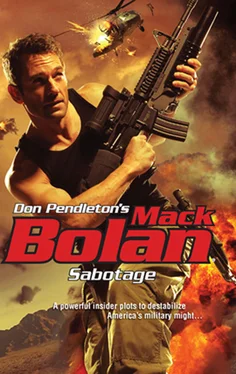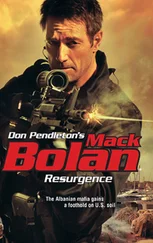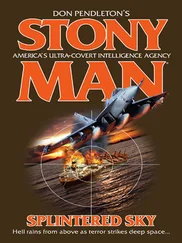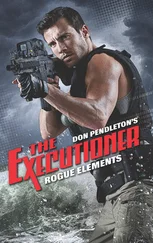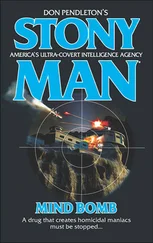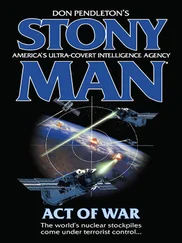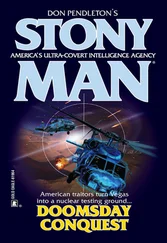Nothing.
The foyer was empty, the floors a dusty and ancient linoleum that hadn’t seen a good waxing in years. Bolan walked through the first set of doors and paused, peering through the gap between the inner doors. Beyond, he could see a fairly typical light industrial area. Workbenches were arrayed across the plant floor, which had a high ceiling and walls dotted with dusty, multipaned windows. Many of the windows were painted over. Fluorescent lights suspended from the high ceiling buzzed and cast a greenish-yellow hue over the interior. At the rear of the floor space, which was at the far end of the building, Bolan saw a sign that read, simply, Office.
The benches held many cardboard boxes, plastic racks and rows of what, from this distance, appeared to be circuit boards. Men in casual street clothes—Bolan looked carefully, but saw no women—were standing among the benches, half-crouched as they bent over their work. Some of them wore magnifying lenses on straps around their heads, presumably for seeing the fine details of complicated work.
In short, the plant looked like exactly what it was supposed to be.
Bolan was mildly surprised by that. He had expected to see something far more nefarious. He started to back out the way he came in, careful to keep the Tavor out of sight behind his leg.
A shadow moved on the other side of the door, and Bolan’s combat instinct prompted him to hit the floor. A bullet burned past him. The gunner on the other side of the double doors continued to shoot through the barrier, apparently sighting through the gap between them.
Bolan rolled out of the path of the bullets, bringing up the Tavor, surging to his feet. He angled his fire down, careful to avoid indiscriminately spraying the room beyond the doors, instead triggering a withering blast at knee level. The gunner on the other side of the doors screamed.
The soldier kicked the doors in, stepping over the writhing gunman as he did so. The workers beyond scrambled for cover. Pausing over the wounded man, Bolan kicked his handgun away.
“No one move!” he ordered. “Lay down your weapons and place your hands behind your head!”
Movement from two directions caught his eye. A stream of full-auto fire, the unmistakable, hollow metallic clatter of Kalashnikov rifles, ripped through the space, shredding the components on top of several benches between the shooters and Mack Bolan. The soldier dived and rolled to the side, angling toward a heavy metal rolling toolbox. The toolbox rang like a bell as 7.62 mm fire from the assault rifles ripped into it.
The Executioner fished a flash-bang grenade out of his war bag, considered it and grabbed a second. He yanked the pins from each bomb in succession, then whipped the grenades in opposite directions, toward the points of fire converging on his location. Curling his chin into his chest, he squeezed his eyes shut, opened his mouth and covered his ears.
The searing flashes were accompanied by a deafening wallop. Even though he was prepared for it, Bolan’s ears were ringing in the wake of the powerful light-and-sound explosions. He surged to his feet, breaking cover with the Tavor’s integrated red-dot sight seeking targets. The first AK gunner had dropped his rifle and was holding his eyes, staggering back and forth in place. Bolan put a 5.56 mm round through his head and made a quarter turn, bringing the second man into line. That man was starting to recover, and clawed for a handgun in his waistband. Bolan burned him down with a short burst.
The soldier checked his six, then each point of the compass, assessing his surroundings. Somewhere, a worker whimpered. Bolan tracked the noise and found a twentysomething man with lanky blond hair, dressed in a flannel shirt and ripped jeans. He was cowering under one of the workbenches. He still wore a wrist strap connected to a ground wire, a precaution against electrostatic discharge.
Bolan gestured with his rifle. “You.”
The young man’s eyes went wide. He looked left, then right, crouched on his back in a near fetal position. “M-m-me?” he stammered.
“You.” Bolan nodded. “How many armed guards?”
“What?”
“Armed guards. Men with firearms. How many in this facility?”
“J-ju…just those two,” the young man managed to tell him. “Plus the guy at the door. Jesus, you killed them. You killed them both.”
“Stay with me,” Bolan said, kicking one of the man’s feet with his own combat boot. He didn’t bother to point out that he hadn’t, in fact, killed the door guard. “Focus, kid. Why were they here? Why attack me?”
“I don’t know,” the young man admitted. “We…we just work here, man. We just work here.”
“Work here doing what? What are you building?”
“How should I know?” the man said, indignant. “They give us the specs and we build the boards. I don’t ask. I get paid by the board. I just do my job.”
“Get up,” Bolan said. “Get the rest of the workers together. Get out of here.”
“Why?” the kid asked, pulling himself up, using the workbench for support. He was rapidly regaining his composure; it was dawning on him that Bolan didn’t intend to kill him.
“You’re out of a job, kid,” Bolan told him. “Get the others and get gone. Don’t make me tell you again.”
The young man did not need any further urging. He ran among the benches, grabbing each of his fellow assemblers, urging them on and even shouting at them when they hesitated. Under Bolan’s watchful eye, the workers hit the bullet-pocked double doors and ran for it.
The numbers were ticking down in the soldier’s head. One of those workers was bound to call the police, if a silent alarm hadn’t already been triggered. He thought it unlikely, though, that there was such an alarm, at least not one connected to local law enforcement. Those whose facilities were guarded by gunmen wielding presumably illegal, full-auto Kalashnikovs probably didn’t welcome police involvement in their affairs.
Still, one of the assemblers was probably on a wireless phone to the cops right now. Bolan would have only a little time before the place was overrun.
The wounded gunman was still rolling around on the floor, holding his legs and groaning. Bolan walked up and stood over him, the Tavor held loosely in one hand, the barrel of the rifle pointed at the man’s forehead.
“I want to know everything you know about your employers and this facility,” Bolan said. “I don’t have a lot of time. If you can’t tell me anything, your usefulness to me is limited. If I have to hurt you to make you talk, I will.” This was a bluff, of course; Bolan, the man once known as Sergeant Mercy, would never torture a helpless, unarmed and wounded man. The Executioner had seen far too many victims of torture and interrogation in the course of his personal war. He would never join the ranks of the butchers who did such things to prisoners. This particular prisoner, however, couldn’t know that.
“Don’t, man, don’t,” the gunner said, clenching his teeth through the pain. “I got nothin’ here.… Let me—”
The revolver appeared in the man’s hand as if by magic, pulled from a holster in his waistband, behind his hip. Bolan triggered a single round from the Tavor into the man’s head, the shot echoing across the assembly plant floor.
Searching the dead man’s pockets, Bolan finally found something of value: a laminated identity card bearing the corporate logo of a company called Security Consultants and Researchers. The letters SCAR were emblazoned in heavy block letters across the bottom of the card, which also bore the man’s name. Bolan took a moment to remove his secure phone, snap a digital photograph of the card and transmit the image to the Farm. He took and sent a picture of the dead man, too, for confirmation of ID if nothing else.
Читать дальше
